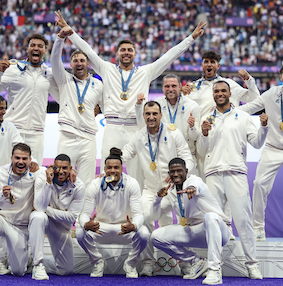The 2024 Olympic Games: Triumph, Tribulation, and the Lessons We Can Learn
The 2024 Olympic Games arrived like a tidal wave, crashing into the global consciousness with all the grandeur, drama, and tension that make the Olympics the greatest spectacle on Earth.<br> Hosted in the vibrant, historic city of Paris, this year’s Games were a testament to the resilience of the human spirit, but also a mirror reflecting the complexities of our modern world. <br>From awe-inspiring performances to hard-hitting controversies, Paris 2024 was not just about athletic glory—it was about the way sports can unite, divide, and ultimately teach us about who we are.
2024 Olympic Highlights: When Legends Rise
The Return of Simone Biles
One of the biggest highlights was the return of Simone Biles, the gymnastics legend who had stepped away from competition in 2020 due to mental health concerns.
Biles made a triumphant comeback in Paris, winning gold in the all-around and solidifying her place as one of the greatest gymnasts of all time.
Her story was not just about physical prowess, but about perseverance, self-care, and the importance of mental health—a theme that resonated deeply with audiences around the world.

On the Track
Lyles, who had already made waves as one of the fastest men on the planet, set a new world record in the 200 meters, breaking Usain Bolt’s long-standing mark.
His victory lap, draped in the American flag, was a moment that will live on in Olympic lore—a reminder of the unyielding human drive to push boundaries and break records.

Swimming
On the swimming front, Katie Ledecky continued to dominate the pool, adding more gold medals to her already staggering collection.
Her performance was a masterclass in endurance and technique, proving that she’s not just one of the best swimmers of her generation, but one of the greatest of all time.

How did the French do at home?
Paris 2024 was as much a celebration of French excellence as it was a global event, and the city embraced it with open arms.

The Lows: When Reality Hits
The 2024 Games, like any major event, had their share of low points and one of the biggest controversies revolved around the Russian athletes competing under a neutral flag due to ongoing sanctions against Russia for doping violations.
The presence of these athletes sparked heated debates about fairness and accountability in sports, with some questioning whether the Olympic Committee was truly enforcing its anti-doping policies or simply paying lip service to the issue.
The environmental impact of the Games also drew criticism. Despite efforts to promote sustainability, the sheer scale of the event—complete with massive construction projects, increased pollution, and the carbon footprint of millions of spectators—raised questions about whether the Olympics can ever truly be “green.”
The message of environmental responsibility felt at odds with the reality on the ground, and for many, this disconnect was hard to ignore.
And then there were the moments that no one wants to see—athletes falling short of their dreams, heartbreaking injuries, and the ever-present worry of COVID-19.
While the world has largely moved on from the pandemic, the virus still cast a shadow over the Games, with several athletes forced to withdraw due to positive tests.
It was a sobering reminder that even in moments of triumph, the challenges of the real world are never far behind.

What We Can Learn: The Bigger Picture
First, these Games reinforced the importance of mental health in sports.
Simone Biles’ return wasn’t just a personal victory—it was a statement about the need to prioritize well-being over relentless pursuit of success.
Athletes are human beings, not machines, and their stories remind us that it’s okay to step back, to take care of ourselves, and to ask for help when we need it.
Secondly, the controversies surrounding doping and neutrality showed us that integrity in sports is an ongoing battle.
The Olympic spirit is about fair play, but maintaining that ideal requires constant vigilance.
As fans, we must hold the powers that be accountable to ensure that the playing field remains as level as possible.
Finally, the environmental concerns highlight the need for major events to adapt to a world that is increasingly aware of its impact on the planet.
The Olympics should be a symbol of progress, not just in terms of athletic achievement, but in how we treat our environment.
As we look to the future, there’s hope that future Games can be more sustainable, more responsible, and more in tune with the planet’s needs.
In the end, Paris 2024 was more than just a sports event—it was a reflection of our times and it showcased the best of humanity’s potential while reminding us of the work that still needs to be done.
The Olympics may be over, but the lessons they’ve taught us will resonate long after the torch is extinguished.

